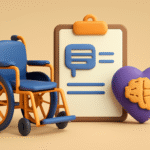When we talk about inclusion, most people think of government policies, accessibility guidelines, or international conventions. And while these are important, the truth is this: the real measure of inclusion is not in documents—it is in our everyday behavior.
For persons with disabilities, inclusion doesn’t simply mean a legal right written in the Constitution. It means being able to enter a café without a flight of stairs stopping them. It means applying for a job without their wheelchair being seen as a limitation. It means joining a community event without being reduced to an object of sympathy.
And here’s the reality we often overlook: inclusion is not built only by systems—it is built by people. It is built by you.
Small Acts, Powerful Impact
You don’t have to be a policymaker or a social activist to practice inclusion. Sometimes, the smallest of daily actions carry the greatest meaning:
- Mind your language: Replace casual stereotypes with respect. Words can either wound or heal.
- Invite, don’t exclude: If someone is standing on the sidelines, a simple “join us” can change everything.
- Notice barriers and act: Whether it’s a missing ramp, an inaccessible washroom, or a biased remark—don’t ignore it. Raise your voice.
- Value mental health: Inclusion isn’t only physical—it’s also about emotional safety and acceptance.
- Celebrate diversity: Disability is not about limitation—it’s about different ways of experiencing and contributing to the world.
Why Sympathy Isn’t Enough
One of the greatest barriers persons with disabilities face isn’t their condition—it’s the way society reacts. Sympathy may feel kind, but it quietly reduces people to objects of pity.
What we need instead is:
- Empathy: “I respect your journey.”
- Solidarity: “I stand with you.”
Sympathy builds walls. Empathy builds bridges. Solidarity walks across them.
The Inclusion Challenge
Here’s a thought: what if each of us picked just one inclusive habit and practiced it every single day?
It could be as small as holding space in a conversation, speaking up when you see exclusion, or demanding accessibility where it is missing.
That ripple effect could transform not just communities, but the entire culture we live in.
Final Word
Inclusion is not a distant dream or a heavy policy framework. It’s in the words we use, the designs we create, the attitudes we hold.
For persons with disabilities, these so-called “small” acts are not small at all—they are life-changing.
So the next time you wonder how to build a more equal world, remember this: don’t wait for change—be the habit that creates it.



